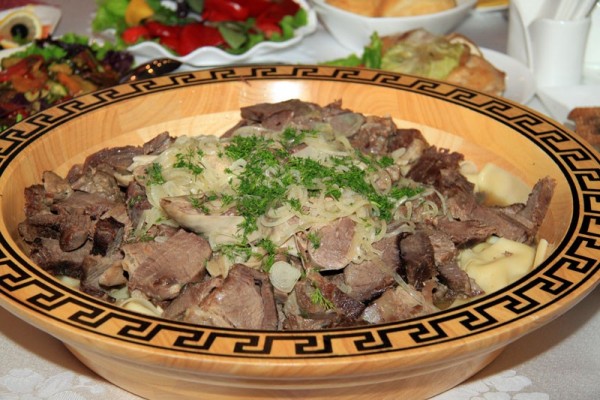ASTANA – Social isolation and the phenomenon of “living on your own” probably sound quite bizarre to most Kazakhs. The country’s nomadic background and adherence to a traditional lifestyle contribute to its historic preservation. Traditions are important, as they serve as the basis of a nation’s unity and harmony.
Kazakh people are known to be hospitable. It is a sign of generosity to meet guests with warmth and attentiveness and the Kazakh saying “Konak keldi – irisyn ala keldi” (“The guest comes and brings happiness to the home”) proves the idea.
History of the tradition
From ancient times, the most delicious meal in every family is kept for guests. An unexpected guest is named kudaiy konak (“a guest sent by God”).
Guests were welcomed by a sumptuous dastarkhan (table setting) with baursak (puffy fried bread), sweets and beshbarmak (the national meal of boiled horse meat with pastry noodles and potatoes).
People played musical instruments, performed songs, participated in aitys (song contest) and organised games among young people. A host tried his best to please his guests. If someone came with children, the youngsters were given sweets or presents, for it was believed if a child left upset, he or she would take the happiness from the home. A few presents or sweets were also available for the adult guests.
Modern guest reception traditions
As the main national tradition, hospitality eventually transformed into a trait displayed by every Kazakh, according to visitkazakhstan.kz.
Food abundance and diversity are essential for the host to demonstrate his generosity. The menu generally consists of three parts – cold cuts and dishes made from horse meat including kazy, karta, zhaya or beshbarmak; dishes from the Russian or Uzbek cuisines like manty (a dough pocket filled with meat) or plov (rice with meat) and a tea-drinking ceremony with a variety of fruits, cakes, candy, cookies, raisins, dried apricots, nuts, homemade jam and baursak.
The oldest guest is asked to give a blessing at the end of the feast.
Aiman Zholamanova, 50, loyally follows all the principles and rules of established Kazakh values regarding communication within the family. She feels the tradition of hospitality is the most reliable way to preserve and strengthen family ties.
As an independent freelancer, she has enough time to prepare for guests.
“My family has a tradition to invite guests during national holidays, birthday parties and weddings. We even have a certain ritual when my husband is responsible for creating the guest list and making invitations. My daughters go shopping and make salads and chocolate cakes. It is really important to have home-made cakes, pies and other bakery products. You should amaze your guests with your dastarkhan,” Zholamanova told The Astana Times.
Beshbarmak, or the “five-finger dish”, is the most prestigious part of the meal. The dish has a certain symbolism characterised by ritual distribution of various parts of the cooked meat.
“As for making beshbarmak, my mother taught me how to make it and it is really the best and delicious meal for a large group of guests. I never experiment with the main dish,” she said.
Zholamanova noted the idea is not just to invite people, but to share some joyous moments in life with friends and relatives.
“The most valuable thing in preparation for the guests is to do it all by hand. Of course you can buy or order food, but since I have free time I like to cook myself. Handmade meals are a sign of respect for your guests,” she said.
Kazakh culture also has a tradition of inviting newlyweds after their marriage for a housewarming party.
“If you’re moving to a new location, then you invite your neighbours to get acquainted and show your house. In response, they invite you to visit as a sign of respect and solidarity. You can only visit your close relatives without an invitation to celebrate Women’s Day, Nauryz or New Year. Recently, our nephew had a baby girl and after 40 days, according to tradition, we invited them to us,” she said.



